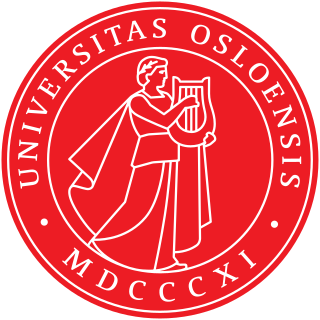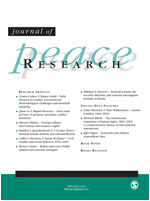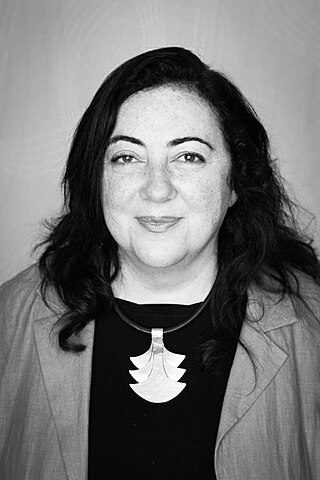
The University of Oslo is a public research university located in Oslo, Norway. It is the oldest university in Norway. Originally named the Royal Frederick University, the university was established in 1811 as the de facto Norwegian continuation of Denmark-Norway's common university, the University of Copenhagen, with which it shares many traditions. It was named for King Frederick VI of Denmark and Norway, and received its current name in 1939. The university was commonly nicknamed "The Royal Frederick's" before the name change, and informally also referred to simply as Universitetet.

Johan Vincent Galtung is a Norwegian sociologist who is the principal founder of the discipline of peace and conflict studies. He was the main founder of the Peace Research Institute Oslo (PRIO) in 1959 and served as its first director until 1970. He also established the Journal of Peace Research in 1964.
Stein Dorenfeldt Tønnesson, is a Norwegian historian.

Peace and conflict studies or conflict analysis and resolution is a social science field that identifies and analyzes violent and nonviolent behaviors as well as the structural mechanisms attending conflicts, with a view towards understanding those processes which lead to a more desirable human condition. A variation on this, peace studies (irenology), is an interdisciplinary effort aiming at the prevention, de-escalation, and solution of conflicts by peaceful means, thereby seeking "victory" for all parties involved in the conflict.
The Norwegian Institute of International Affairs is a Norwegian research institution based in Oslo, Norway. It was established by the Norwegian Parliament in 1959.

The Journal of Peace Research is a bimonthly peer-reviewed academic journal that publishes scholarly articles and book reviews in the fields of peace and conflict studies, conflict resolution, and international security. It was established by Johan Galtung in 1964 and has been published since 1998. Nils Petter Gleditsch was editor-in-chief from 1983 to 2010; between 2010 and 2017 the editor was Henrik Urdal, and as of July 2010 the editor is Gudrun Østby.

DCAF- ; Geneva Centre for Security Sector Governance is an intergovernmental foundation-based think tank that provides research and project support to states and international actors in improving security sector governance and reform.
Hilde Henriksen Waage is a Norwegian historian and peace researcher. She is Professor of History at the University of Oslo and was acting Director of Peace Research Institute Oslo from 1992 to 1993. Waage is an expert on the Israeli–Palestinian conflict and Norway–Israel relations.
The Geneva Centre for Security Policy (GCSP) is an international foundation that was established in 1995 under Swiss law to "promote the building and maintenance of peace, security and stability". The GCSP was founded by the Federal Department of Defence, Civil Protection and Sports in cooperation with the Federal Department of Foreign Affairs as a Swiss contribution to Partnership for Peace (PfP).
Sverre Lodgaard is a Norwegian political scientist who has held several senior positions within government and non-governmental organizations, including the Norwegian Institute of International Affairs (NUPI). Lodgaard specializes in peace, foreign and security policy, but has also worked on developing country issues. He has since the 2000s written extensively on nuclear arms control and disarmament issues and on Middle East affairs.
Helga Marie Hernes is a German-born Norwegian political scientist, diplomat, and politician for the Labour Party.

Kristian Berg Harpviken is a Norwegian sociologist and researcher, and since 2009 director of the Peace Research Institute Oslo (PRIO). Harpviken is foremost known for his competence on Afghanistan, where he has travelled extensively and conducted multiple field works since he first engaged with the country in 1989.
Nils Petter Gleditsch is a Norwegian sociologist and political scientist. He is Research Professor at the Peace Research Institute Oslo (PRIO). In 2009, Nils Petter Gleditsch was awarded the annual Award for Outstanding Research by the Research Council of Norway. He won the Norwegian Sociological Association's Lifetime Achievement Award in 2018.

Scott Gates is an American political scientist and economist based in Norway. He was director of the Peace Research Institute Oslo (PRIO)'s Centre for the Study of Civil War (CSCW), which was a Norwegian Center of Excellence funded by the Research Council of Norway for a twelve-year period 2002-2013. He is currently a Research Professor at PRIO, a Guest Researcher at ESOP in the Department of Economics at the University in Oslo and also holds a professorship in the Department of Political science at the University of Oslo. He used to work at the Norwegian University of Science and Technology (NTNU) and Michigan State University (MSU).

J. Peter Burgess is a philosopher and political scientist. He is Professor and Director of the Chair of Geopolitics of Risk at the Ecole Normale Supérieure, Paris. He is series editor of the Routledge New Security Studies collection. His research and writing concern the meeting place between science, culture and politics in particular in Europe, focusing most recently on value theory and digital technologies. He has published 18 books and over 100 articles in the fields of philosophy, political science, gender studies, cultural history, security studies and cultural theory. He has contributed to research and educational policy in Norway, France, Poland and the European Commission. In addition, he has developed and directed a number of comprehensive collaborative research projects with Norwegian and European partners.

Henrik Urdal is a Norwegian political scientist and the current director of the Peace Research Institute Oslo (PRIO). Before his appointment as director in 2017 he was a research professor and research director at the institute. He was editor-in-chief of the Journal of Peace Research, the premier journal in the field, from 2010 to 2017.

Dan Smith OBE is a British author, cartographer and peace researcher. He is currently the Director of the Stockholm International Peace Research Institute (SIPRI).

Shahrbanou Tadjbakhsh is an Iranian-American researcher, university lecturer, and United Nations consultant in peacebuilding, conflict resolution, counter-terrorism, and radicalization, best known for her work in "Human Security" and for contributions in the republics of Central Asia and Afghanistan, as cited by the New York Times and other publications as well as hundreds of scholarly publications. Currently, she is a lecturer at Sciences Po, researcher, and consultant to the United Nations.

Henrik Syse is a Norwegian philosopher, author, and lecturer. He is a research professor at the Peace Research Institute Oslo (PRIO), and a part-time Professor of Peace and Conflict Studies at Bjørknes College in Oslo. He was a member of the Norwegian Nobel Committee, which awards the Nobel Peace Prize, from 2015 to 2020, and was a member of the Norwegian Press Complaints Commission from 2002 to 2016. Syse also teaches at the Norwegian Defence University College, BI Norwegian Business School, MF Norwegian School of Theology, the University of Oslo, and other institutions of higher learning, and he is Chief Editor of the Journal of Military Ethics, a peer-reviewed journal published by Taylor & Francis.
The Peace Research Institute Oslo (PRIO) Director's Shortlist is a list of candidates considered worthy to win the Nobel Peace Prize for their efforts and actions for the promotion of peace. It has been prepared by the director of the Peace Research Institute Oslo since 2002, and is a list of the most worthy potential Nobel laureates based on independent research and assessments.















